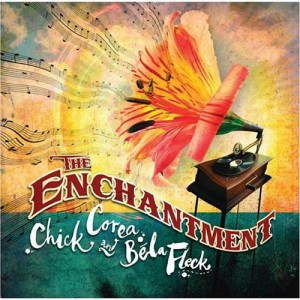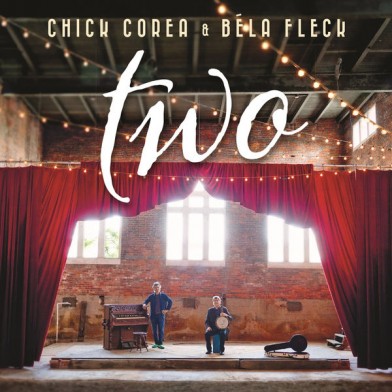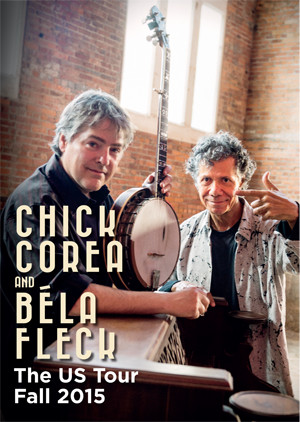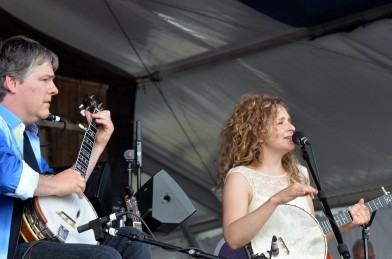Béla Fleck is one busy musician. The 16-time Grammy Award-winner banjoist still runs his 20-year-plus old project Béla Fleck & the Flecktones with bassist Victor Wooten, tours in a bluegrass banjo duo with his wife Abigail Washburn, and for the past 8 years has recorded and toured with jazz pianist Chick Corea.
Corea, major figure in the development of the electric jazz fusion movement after his brief passage in Miles Davis’ band, is an expert in the art of the duo. With classic collaborative albums like his grand releases aside vibraphonist Gary Burton, his more recent piano face-off with Japanese virtuoso Hiromi, or yet live duo sets with his friend and former Return to Forever bandmate, bassist Stanley Clarke, Corea seems to enjoy the challenges of one-on-one conversations in music.
 Corea’s collaboration with Fleck is one that was achieved consistent success over the past eight years. The project brought about two recordings. 2007’s The Enchantment captured the raw voices of a very fresh connection, with Corea and Fleck finding their way around one another’s playing on a record that was made in less than four days.
Corea’s collaboration with Fleck is one that was achieved consistent success over the past eight years. The project brought about two recordings. 2007’s The Enchantment captured the raw voices of a very fresh connection, with Corea and Fleck finding their way around one another’s playing on a record that was made in less than four days.
Two (Live), the two-CD set they released last September, was compiled from various live recordings from the 55 shows the pair played in the seven years that followed The Enchantment. It includes massively-reworked tunes from the previous release, as well as new titles, that display the playful complicity that developed between the two musicians during their years on the road.
Today, Fleck and Corea are on the road again, and will take their duo to the Orpheum Theater in New Orleans on Saturday, April 16. I caught up with Béla Fleck over the phone, as he was preparing for another show in Worcester, Massachusetts.
How’s this April tour going so far?
It’s amazing. I mean, every time I get to play with this guy it’s a trip. So much fun.
Had it been a long time since you last played together?
Yeah the last time we played was in September. Like, every 6 months or even year we get together and do a few weeks, so it keeps it really special when we get together.
I think it’s been almost a year since Two came out. Looking back, what’s that year been like for you concerning this whole duo project?
Honestly the process of making the record made us a better duo cause we both listened to a lot of recordings to pick what we wanted to put out there. And the recordings all came from live performances over the last eight years that we’ve been doing, so it seems like we’re just doing a gig here and there. But I think now we’ve done about 70 or 80 shows, so by that time there’s a sense, when we come back to it each time, that we can push it to a different place.
For a long time we never changed the material, and we just kept playing the same stuff. We never got tired of that material because we’d only play it for a couple weeks and then we would go to other projects. And he and I have a lot of different projects and we tend to have material that sticks to that project, you go play with this guy and you play these tunes. But when you do it enough you start to want to do some new material. We just seemed to be on so much natural spark every time we got back together, all experiences that we’d had separately we’d bring to these same tunes.
But now, this trip we’ve actually started working up some new things. This tour we’re going even further, it feels like there’s a fresh wind. Making the record felt good, but I just think every time we get back together we realize that we really enjoy it. It’s a unique little bubble of musical experience, and I’m always very happy to see that we’re gonna get to do it again.
What is it in that dynamic between you two that makes that duet so consistent throughout the years?
Well, one of the talents of a great jazz musician is to make material fresh every time you play it. And so Chick is a master at that anyway. You know he just gets real sparkly and sharp, and I tend to do that too, like I’m waiting all day to get to the stage, and when I get to the stage then I’m trying to be at my highest level, you know. I have to say Chick is one of those amazing duo partners. He plays with a lot of people and he brings that spark, that sparkle to everything he does.
I think a real big piece of it is his rhythmic gift. Not only does he have incredible complexity of rhythm, he plays so clearly and his timing is so true that it makes it easy for the audience to understand and it’s easy for his collaborators to understand what he’s doing even when he’s dealing with very heavy, complex concepts.
So being a banjo player, I mean banjo is really all about rhythm too, it’s like almost a percussion instrument. And he plays the piano like a percussion instrument. So, in a way, it’s like you have two drummers playing together, or two percussion players playing together. We get really connected on our eighth notes and our sixteenth notes, that’s just there. I mean from the first time we played together it was just super easy and that immediately was the basis of our duo, was this rhythmic understanding. Which is a lot of what bluegrass is about too. That’s the inner pulse of great bluegrass. Well Chick’s got that feel too, he can do that too. Not all musicians can play like that.
I was amazed at his ability to bring his own self into kind of your territory. I was thinking of the Two recording, the ragtime tune, the bugle call.
 Oh yeah, yeah. It’s kind of fun cause I’m pretty much playing it like like I would if I was in a bluegrass band, he’s playing it as… We just connect. There’s one tune called “The Enchantment” that’s got this deep, complex jazz harmony and I have to kind of live in that world and try my best to act like I know what I’m doing in that world, it’s little bit of a hoax.
Oh yeah, yeah. It’s kind of fun cause I’m pretty much playing it like like I would if I was in a bluegrass band, he’s playing it as… We just connect. There’s one tune called “The Enchantment” that’s got this deep, complex jazz harmony and I have to kind of live in that world and try my best to act like I know what I’m doing in that world, it’s little bit of a hoax.
But he also comes to me, like there’s also a tune called “Mountain” where the melodies that we play at the front very much have the sound of traditional music and he does it great. And then when we go to the solos and all of a sudden he’s Chick Corea. So it’s fun to be able to play with those roles, do our separate roles, as I’m the bluegrass guy, he’s the jazz guy and there’s times we kinda meet in the middle or cross into each other’s territory
Lately we’ve been adding some classical things to it, we got this new set of Scarlotti sonatas that we’ve been playing that, we do a little bit of improvising in it but mostly we play them pretty much set.
It’s a bit of a revelation to hear it on these instruments in the middle of a set of improvising. So things like that and we’ve been bringing in other things, newer tunes, a new tune of Chick’s that he hadn’t played much before which is exciting for me and then also a Bill Monroe tune we just brought in, a really cool old traditional song.
So it’s fun, it seems like a long collaboration, the idea that we’re gonna keep coming back to it and we’re gonna keep getting better and better at this duo, finding new ways to make it fresh. It’s a very warm thing. And then I get to hear all the stories about Miles Davis and Return to Forever, and the different parts of his career that I remember that he’s my hero and one of the great icons of jazz music and I’m riding around on a tour bus or an airplane with him. It’s beautiful.
When did you first get to meet him?
I met him first, I’m gonna say it was early 90’s when the Fleck Tones started touring, doing Jazz Festivals for the first time. That was really exciting for us ‘cause we were all big jazz fans but we played music that was really outside any particular idiom but closer to jazz than anything else. So occasionally we would get to play and run into him backstage. And we met at the Grammy’s one year, and we were all nominated for things and got to hang out with him and then after that I asked him to play on a track for me and he said yes so we did like three tracks on one of my albums. And then I never would’ve bothered him again, I was pretty thrilled that we’d gotten to do something together. He got in touch with me and said “Hey, I’m thinking about doing some more duos and I thought that you’d be a good duo partner.” And I was like “Count me in! I’ll do it! By all means.”
What are the challenging parts of going back and forth with those two, as you said, very rhythmic instruments in the music?
It’s harder to play the lyrical music, you know. And I’d say the one technical challenge is that the piano occupies a lot of space and the banjo and the piano together are more like brothers, they’re similar in their sharp attack.
Obviously the piano has a lot more options, there’s a lot more ways to play it, a lot more dynamics that are possible with it than with the banjo. But I don’t know, we tend to just sort of ride the things that are good, that are into personalities. I tend to, because I’m a banjo player I tend to play music that works. But within the speed and the cage that I’m in, I try to find that lyricism in fast music and I find ways to make a lyrical sound that’s not based on holding one note for a long time since I can’t. I try to find ways to work lyrical ideas, and he does too. We find more and more ways to do what we do well, and we both have a sense of what works and what doesn’t work and that’s sort of a hard thing to quantify.
But I can tell you every Chick Corea show that I’ve been to, he found some way, whether he was playing in a conventional jazz setting or anything else, he found some way to reach out to the audience that they remembered. And that’s something I’ve learned from him, that somehow you have to get out, reach out to the people with your music. And I mean whether he’ll go and start playing the piano inside the piano or he’ll get the audience to do a call and response thing, he’s just the sense of humor, there’s always a sense of humor and the sense of keen intelligence going on.
Every day is an opportunity to connect with the musicians on stage in a deep way as if it was the last gig you were ever gonna play, and it’s also a chance to connect with the audience to put that music out there. So I learn a lot from that, I’m a fan of that approach.
You have so many different projects that you’re carrying on that are so different. What does this one in particular with Chick allow you to do that you couldn’t in your other projects?
Well there’s something about a duo. It’s very intimate and it’s very focused and I’m very much reacting to one of my favorite musicians and a formative musician in my musical world because he’s someone I focused in on early on, soon after I started playing the banjo he became a hero to me. And for me to sort of have time on the bandstand with an older musician that’s a venerable musician, a genius of jazz, one of the top jazz musicians in the world, get to explore with him is one of the greatest experiences of my life.
Now I can’t say it’s greater or less great than putting the Fleck Tones together or playing with my wife, that’ll bring different things like there’s a warmth and a joy to playing with my wife and a connection to tradition that I haven’t been able to be a part of in a long time that I love. And with the Fleck Tones it’s all, it’s my music a lot of it and the way the guys all come together around it and sort of the community of like-minded strange individuals, society of odd musicians is something that I’m very proud of and I can’t compare it to anything else.
In a 1991 OffBeat article, Keith Spera interviews and opposes you with Danny Barker. He mentions that you got a chance to meet Barker, who is the big banjo hero down here, I was wondering if you had any memories from that?
 I do. Every time I do a seminar I talk about Barker because I got to spend some time with him. In fact, one time when I came down to New Orleans to play with the Fleck Tones, Danny Barker came to our hotel room and we interviewed him. And Victor had a camera on him and we talked all about the banjo in jazz and the death of the banjo in jazz and he gave us a lot of really interesting insights.
I do. Every time I do a seminar I talk about Barker because I got to spend some time with him. In fact, one time when I came down to New Orleans to play with the Fleck Tones, Danny Barker came to our hotel room and we interviewed him. And Victor had a camera on him and we talked all about the banjo in jazz and the death of the banjo in jazz and he gave us a lot of really interesting insights.
He talked about how, when the guitar showed up in jazz the banjo was instantly dead and nobody wanted the banjo. ‘Cause it was connected to a lot of things people wanted to forget about, you know, slavery for instance and white folks putting on blackface and singing songs about how great it was to be a slave on the plantation. And that stuff really made, when the black jazz community, to move to a different rhythm instrument, move to guitar, it didn’t carry any of those connotations. They went head first and so it pretty much got excised from the music in most places.
Now New Orleans is one of the few places where jazz still occasionally has a banjo in it and so that makes it very dear to me. But Danny Barker told us a lot of interesting stuff, he was a neat guy.
I’ve heard you say in an interview that you guys want to let every gig have it’s own personality and I think you say “follow the energy of the room”. That’s something you hear a lot, living in New Orleans. People often talk about the energy there is here and how unique the feeling is. I was wondering if you had any experience with that feel, the New Orleans energy.
Yeah there’s certain towns you go to and play and you can and you don’t know why it was easy there. And sometimes it has to do with the room you’re in and sometimes it has to do with the way people are listening and the energy that they receive your music with.
New Orleans is one of those towns where, I can never think of playing in New Orleans where I didn’t play at my best. So it makes me want to go back to New Orleans and go again.
Part of it is that there is this receptivity to the kind of things that I do. And I’ve seen it for a lot of music, there’s a very deep love of music in that town and it’s not a museum piece, it’s received with energy as well as respect and so that makes you feel good. Like if an audience is totally dead silent they might think they’re giving you the most respect but in a way that feels kind of dead and if an audience is giving you some energy but knows how not to give energy, that’s the most perfect situation you could have cause then they feed you and they push you up to the next level musically and you start to strive to take it in and use it as propulsion for the show and it’s like the show is playing itself when that happens. I’ve had a lot of experience like that in New Orleans and I think it’s the environment and the people and the appreciation for music in that town.
Chick Corea & Béla Fleck are playing at the Orpheum Theater on April 16. Doors open at 7 p.m., show starts at 8 p.m. Tickets are available on orpheumnola.com.




